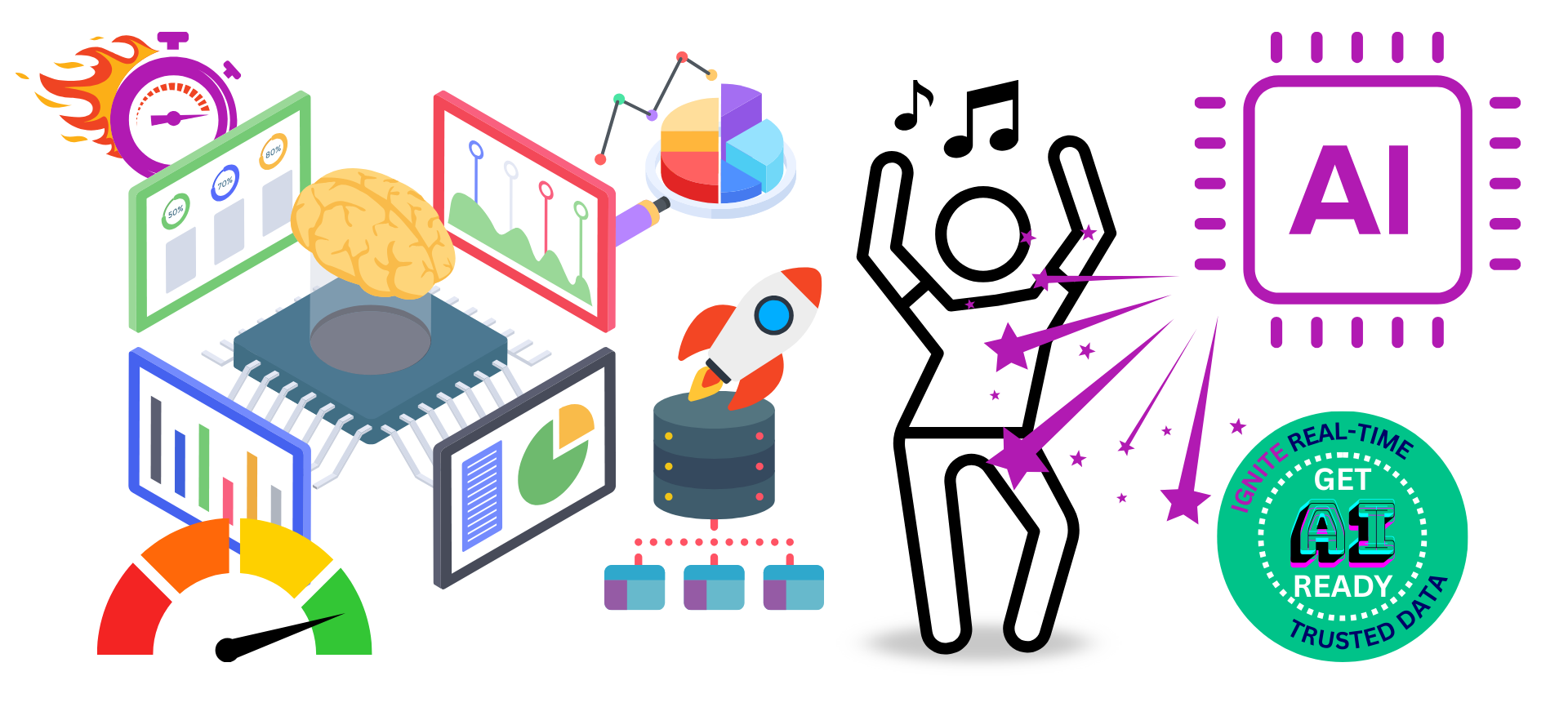Insights and Articles
A diverse range of technology industry-focused articles, blogs, tips, insights and opinion pieces. Read now.
insights

By Sida4
•
August 27, 2025
Artificial Intelligence (AI) is a 'must' not a 'maybe' in business. Many organisations are already transforming themsleves and their industries by reshaping customer experiences, and driving new business models. Yet, despite the promise of AI, many organisations are also finding themselves unable to unlock its full potential due to the both speed to access of their siloed data and its quality. The reason is simple: AI is only as powerful as the trusted data behind it. If your data is fragmented, inconsistent, lacks trust, locked away in systems that don’t talk to each other, or even a mix of issues - then even the most sophisticated AI cannot deliver meaningful insights. Before you can leverage AI to innovate (and reduce operational costs), you must first focus on ensuring all of your high-value data is AI ready. The challenges of creating AI-ready Data Most businesses have no shortage of data. What they lack is data they can trust—accessible in real-time, consistent across the organisation, and managed under strong governance. Some of the most common challenges we see include: Data silos: Different departments often manage their own systems and datasets, creating silos that prevent a unified view of the organisation. Without integrated data, AI models cannot gain a complete perspective. Poor data quality: Duplicates, missing fields, and inconsistent formatting erode confidence in data. AI trained on flawed data produces flawed outcomes. Lack of real-time access: Traditional batch processing means data is hours or even days old. In an era where business decisions need to be made instantly, AI insights based on stale data are of limited value. Legacy systems: Many organisations still rely on platforms that do not integrate easily with modern data pipelines. These closed systems block the free flow of data needed for AI adoption. Weak governance: Data without governance is not only unreliable, but risky. Without strong controls, organisations face compliance breaches, security vulnerabilities, and reputational damage. "These challenges are why many AI initiatives underdeliver. They don’t fail because the AI technology is lacking — but because the data foundation simply isn’t ready."

By Sida4
•
June 2, 2025
Have you ever wondered why today’s systems are not quite coping – and being perplexed with what’s actually happening in today’s environment. Certainly, this lack of ‘coping’ is something that we have had a lot of conversation with clients about, particularly over the last 12 months, and for us, what’s coming to the fore is the need for scaled response. Scaled response because the geographies impacted by complex businesses are becoming so much greater. We’re getting scaled weather events that require a much bigger response by government, by not for profits, by all sort of organizations. Social media means that you need a scaled response to a much larger customer base when events happen – or to be able to respond to customer needs such as large scale of data breach and the like. Even when you think about when systems are impacted in some way shape or perform, it’s a much larger impact because you have so many more customers on the end of those systems or their open systems and there’s knock-on effects and unattended consequences when we change things. So, at all levels, we need a much bigger capability than some of their current brittle analog to digital base processes that allow for the scale of what happens today. Data is really events, so many events, events at mass scale. When you start to use your data in terms of your data being an event, it starts to change the way that you manage your business. It enables real-time user experiences, so instead of batch base processes and highly connected systems that require maintenance and point-to-point interfacing, we need scaled responses that are real-time when your data is seen as an event and everything that is connected to that event is updated at the same time. So, mass user experiences get enhanced in a way that they need at once. Having data in an event format enables real-time decisioning to be done as opposed to waiting for all the knock-on systems to be able to make/bring together that information over time. So coupled with data at the center is the ability to then to apply your artificial intelligence, your machine learning to those data environments and those events - that’s what gives you a scale response capability. So why is scaled response important? Scaled response is massively important when significant large geographic issues occur, or when mass events occur in terms of data breaches, when you are launching a brand-new product. "For example, if you are a bank or an insurer to your customer base, you need the ability to able to respond in seconds, in hours – not weeks, not months." You need to be able to respond in a system base way rather than relying on the ability to bring on people capacity, because that is very hard in the current environment with the war for talent. You want scaled response because you want to be able to manage your brand better and not have the negative impact and loss of customers if you don’t do it well in this current environment. By creating a scaled response capability from unlocking your data also means that you less likely to have that failure to launch, so when you are introducing your new product, you want be able to get that product to as many people as quickly as possible. That doesn’t happen if you’re too constrained by how your systems connect and how far they can actually reach. Your ability to avoid failures, to react, to protect, to respond and support your customer-base is absolutely critical because the ability to switch within a scaled response environment is much easier. At Sida4 we believe that the important work for many complex organisations today, is help them to create scaled response environments, and at the center of that is unlocking their data and enabling it to be event-driven. If you’d like to talk more about our data transformation services that can help you create a scaled response environment, just reach out for a chat .

By marketing.sida4
•
May 26, 2025
A golden record (aka single view/complete view) is a term used in the field of data management and refers to a single, authoritative, and accurate representation of a data subject, such as a customer or an employee, that is derived from various sources and maintained in a centralised repository. At a very basic level, you can think of a golden record being a little like a jigsaw puzzle, all pieces are required to see the full picture, or the 'Single view'. However for complex businesses, all of the pieces aren't generally in the same box, same shelf, and some pieces are completely missing, or damaged. Golden records are important because they provide a single source of truth for organisations, which can improve data quality, increase operational efficiency and help prevent errors and inconsistencies across various systems. They also play a critical role in data governance and master data management initiatives, which are necessary for effective decision-making, regulatory compliance, and improved customer experiences. The process of creating a golden record typically involves the following stages: Data Collection: Gathering data from various sources, such as internal systems, external databases, and manual inputs, to create a comprehensive view of the data subject. Data Cleaning and Standardisation: Removing duplicates, correcting errors, and standardizing the data to ensure that it is consistent and accurate. Data Matching and De-duplication: Identifying and merging duplicates and conflicting information to create a single, authoritative representation of the data subject. Data Enrichment: Adding missing or supplementary information to the golden record to make it more complete and useful. Data Validation: Checking the accuracy of the golden record and ensuring that it complies with business rules and data quality standards. Data Maintenance: Regularly updating and maintaining the golden record to keep it accurate and up-to-date. Data Access and Distribution: Providing secure and controlled access to the golden record for authorised users and systems. This process generally requires the use of specialised software and techniques, such as data governance tools, data quality solutions, and master data management platforms. It may also involve collaboration between various teams and departments, such as IT, data management, and business operations. The value of a Golden Record across Retail, Healthcare/NDIS, and Tertiary Education Golden Record for Retailers With a single view of the customer, retailers can access all the relevant data in real-time, empowering them to make informed decisions and take action quickly. This leads to: Faster and more effective marketing and customer service experiences. Improved back office processes to reduce errors, save time, and lower costs. Additionally, having a centralised customer view eliminates the need for manual reporting, freeing up IT resources and allowing retailers to act on insights and make data-driven decisions more quickly. Golden Record for Healthcare and NDIS service providers A Golden Record for healthcare providers refers to a single, accurate and up-to-date version of a patient's information, such as their medical history, demographics, treatment details and support needs, that is accessible to all authorised providers across different healthcare organisations. This information is critical to ensuring quality patient care and reducing errors, as it provides a comprehensive view of a patient's health history and current treatment. Having a ‘Single view’ can help: Improve patient outcomes Faster decisioning for ongoing support needs Reduce duplicative tests and procedures and increase efficiency in the healthcare providers organisation. Golden Record for Tertiary education and universities In the context of tertiary education and universities, a Golden Record can provide significant value by providing a centralised and comprehensive view of each student's educational history, including their personal information, enrollment data, grades, and other academic information. This information can help to: Streamline administrative processes. Connect and correct data across disparate or siloed systems to ensure data accuracy and consistency. Improve decision-making for various stakeholders such as faculty, staff, and students. Improve the ability of universities to track student outcomes. Comply with regulatory requirements. and make data-driven decisions that can improve the overall quality of education. Ultimately, all Data projects should be driven by the need to deliver data trust. Achieving data trust is a key competitive advantage, and that confidence comes from having access to trusted information and insight when you need it. This means ensuring that data is accurate, consistent, and reliable, and that it is used in a responsible and ethical manner. Achieving data trust requires a combination of technical solutions, such as data governance and quality tools, and effective data management processes and policies, such as data privacy and security measures. To do that requires and in-depth understanding of your current state, goals and challenges so we can move towards recommended solution paths with a phased delivery approach. When data is trustworthy, organisations can make better decisions, improve customer experiences, and operate more efficiently, which ultimately leads to better outcomes and business success. Igniting your business potential relies on achieving data trust, and that can start with a simple conversation .






